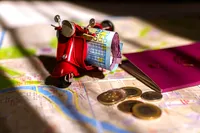Currency in Ireland
What Currency Does Ireland Use Now

Ireland, known as Eire in Irish, a country renowned for its vibrant culture, rolling green landscapes, and strong literary history, is part of the European Union (EU). With its entry into the EU, Ireland replaced the traditional Irish Punt with the Euro in 2002. Being the official currency of Ireland, Euro is represented by the symbol € and standard ISO code EUR. This change was significant as it meant that if you traveled between Ireland and any other Eurozone countries, you wouldn't need to worry about changing currencies.
It's also important to note that the Euro comes in seven different denominations: €5, €10, €20, €50, €100, €200, and €500. There are also Euro coins which come in €1 and €2, along with smaller values of 1, 2, 5, 10, 20, and 50 cents.
Credit and Debit Cards in Ireland

Credit and debit cards are widely used in Ireland and accepted in most places, including shops, restaurants, pubs, and hotels. Large supermarkets and department stores generally accept all major credit cards, including MasterCard, Visa, and American Express. Smaller businesses or family-owned establishments might prefer or even only accept cash, however, such cases are becoming increasingly rare.
Also note, when using a foreign card in Ireland, you will typically be asked whether you would like to complete the transaction in your home currency or Euros. It is typically better to opt for Euros, to avoid your home bank's potentially unfavorable exchange rates.
Using Cash in Ireland
While the usage of credit and debit cards is prevalent throughout urban and most rural locations in Ireland, it is still common for small expenses to be paid for in cash. Items like bus fares, drinks in a pub, or fare for a taxi are often easier to handle using cash. Some local markets and smaller shops outside urban areas may also prefer cash over cards.
Although Ireland is moving towards being a cashless society, yet the cash is far from being redundant. Hence, it's always a good idea to have a small amount of cash on hand for such necessities.
ATMs in Ireland

Also referred to locally as 'cash machines' or 'cash points', ATMs are plentiful across Ireland, in cities and towns, at bank branches, shopping centers, and many convenience stores. They offer a convenient way to withdraw Euros using a credit or debit card. Many ATMs in Ireland are part of the large global networks - Cirrus, Plus, Star, and Maestro, meaning those holding foreign cards can easily withdraw cash.
Always remember that foreign cards usually incur a fee for ATM withdrawals, so check with your home bank before your trip.
Bank Hours
Knowing the bank hours can be important if you need to visit for currency exchange, setting up a temporary account, or other banking services. In Ireland, most banks are open from 9 a.m. to 4 p.m. Monday to Friday, excluding bank holidays.
Some banks may also extend their hours on a Thursday or Friday until 5 p.m. Very few banks open on Saturdays – typically from 10 a.m. until 1 p.m., and rarely do any open on Sundays. It's always recommended to check online for the specific hours of the branch you choose to visit.
In conclusion, the financial system in Ireland is flexible and accommodating, making things quite easy for travelers. From using Euros, credit/debit card payments, withdrawing cash from ATMs, to awareness about banking hours, these are the basics every visitor should grasp before their trip to the Emerald Isle.
